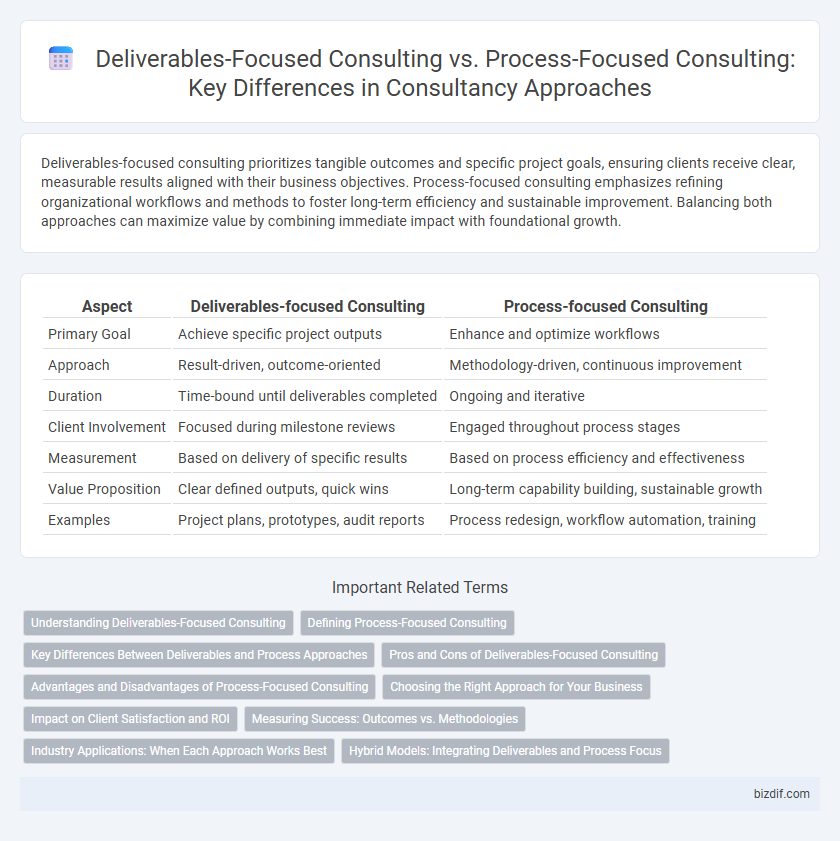Deliverables-focused consulting prioritizes tangible outcomes and specific project goals, ensuring clients receive clear, measurable results aligned with their business objectives. Process-focused consulting emphasizes refining organizational workflows and methods to foster long-term efficiency and sustainable improvement. Balancing both approaches can maximize value by combining immediate impact with foundational growth.
Table of Comparison
| Aspect | Deliverables-focused Consulting | Process-focused Consulting |
|---|---|---|
| Primary Goal | Achieve specific project outputs | Enhance and optimize workflows |
| Approach | Result-driven, outcome-oriented | Methodology-driven, continuous improvement |
| Duration | Time-bound until deliverables completed | Ongoing and iterative |
| Client Involvement | Focused during milestone reviews | Engaged throughout process stages |
| Measurement | Based on delivery of specific results | Based on process efficiency and effectiveness |
| Value Proposition | Clear defined outputs, quick wins | Long-term capability building, sustainable growth |
| Examples | Project plans, prototypes, audit reports | Process redesign, workflow automation, training |
Understanding Deliverables-Focused Consulting
Deliverables-focused consulting prioritizes clear, tangible outcomes that align with specific client goals, ensuring measurable value and accountability throughout the project lifecycle. This approach emphasizes concrete results such as reports, strategies, or implemented solutions, enabling clients to track progress and success efficiently. By concentrating on final products rather than just processes, deliverables-focused consulting fosters transparency and goal-oriented collaboration between consultants and clients.
Defining Process-Focused Consulting
Process-focused consulting emphasizes analyzing, designing, and optimizing a client's workflows and operational methods to enhance efficiency and effectiveness. This consulting type prioritizes developing repeatable processes, fostering continuous improvement, and embedding best practices into organizational culture. Deliverables are often process maps, standard operating procedures, and performance metrics tailored to long-term operational success.
Key Differences Between Deliverables and Process Approaches
Deliverables-focused consulting emphasizes tangible outputs such as reports, analysis, or project milestones, ensuring clients receive clear, measurable results aligned with business objectives. Process-focused consulting concentrates on optimizing workflows, methodologies, and ongoing improvement to enhance operational efficiency and long-term value. Key differences include the prioritization of end products in deliverables-based approaches versus continuous enhancement and adaptability inherent in process-oriented strategies.
Pros and Cons of Deliverables-Focused Consulting
Deliverables-focused consulting offers clear, measurable outcomes that enhance client satisfaction by providing tangible results such as reports, software, or strategic plans. This approach improves project transparency and accountability but may limit flexibility, potentially overlooking evolving client needs or broader business challenges. Focusing solely on deliverables can lead to a transactional relationship, reducing opportunities for continuous improvement and long-term strategic value.
Advantages and Disadvantages of Process-Focused Consulting
Process-focused consulting prioritizes optimizing business workflows and enhancing operational efficiency through continuous improvement methodologies. Advantages include fostering lasting organizational change, enabling adaptability to evolving market conditions, and embedding best practices across departments. Disadvantages involve longer implementation timelines, potential resistance from employees accustomed to existing processes, and difficulty in quantifying immediate ROI compared to deliverables-focused approaches.
Choosing the Right Approach for Your Business
Deliverables-focused consulting prioritizes concrete outcomes such as reports, strategies, and actionable plans tailored to meet specific business goals. Process-focused consulting emphasizes refining internal workflows, enhancing team collaboration, and improving operational efficiency over time. Selecting the right approach depends on your business's immediate needs--opt for deliverables-focused consulting when targeting specific project results and process-focused consulting when aiming for long-term organizational transformation.
Impact on Client Satisfaction and ROI
Deliverables-focused consulting centers on providing specific, measurable outputs, which directly enhances client satisfaction by meeting explicit expectations and delivering clear ROI through tangible results. Process-focused consulting emphasizes continuous improvement and methodology optimization, fostering long-term client engagement and sustainable ROI by aligning strategies with evolving business needs. Combining both approaches often maximizes impact, balancing immediate deliverables with adaptive processes to drive superior client value and financial performance.
Measuring Success: Outcomes vs. Methodologies
Deliverables-focused consulting emphasizes clear, quantifiable outcomes such as project completion, key performance indicators, and return on investment, ensuring clients receive tangible value. Process-focused consulting prioritizes adherence to structured methodologies and best practices, valuing continuous improvement, compliance, and standardized procedures. Measuring success in deliverables-driven approaches centers on outcome achievement, while process-driven models assess effectiveness through methodology execution and efficiency metrics.
Industry Applications: When Each Approach Works Best
Deliverables-focused consulting excels in industries with clear, measurable outcomes such as technology or construction, where clients require specific products or solutions within set timelines. Process-focused consulting is ideal for sectors like healthcare and manufacturing, where optimizing workflows and continuous improvement drive long-term efficiency and quality. Selecting the right approach depends on whether the priority is achieving tangible results quickly or enhancing operational processes for sustained growth.
Hybrid Models: Integrating Deliverables and Process Focus
Hybrid consulting models combine deliverables-focused and process-focused approaches to maximize client value by aligning outcome clarity with continuous improvement. These models emphasize clear, measurable outputs while integrating iterative processes that adapt to evolving client needs and industry dynamics. Effective implementation of hybrid consulting fosters collaboration, agility, and accountability, driving sustainable business transformation.
Deliverables-focused consulting vs Process-focused consulting Infographic

 bizdif.com
bizdif.com